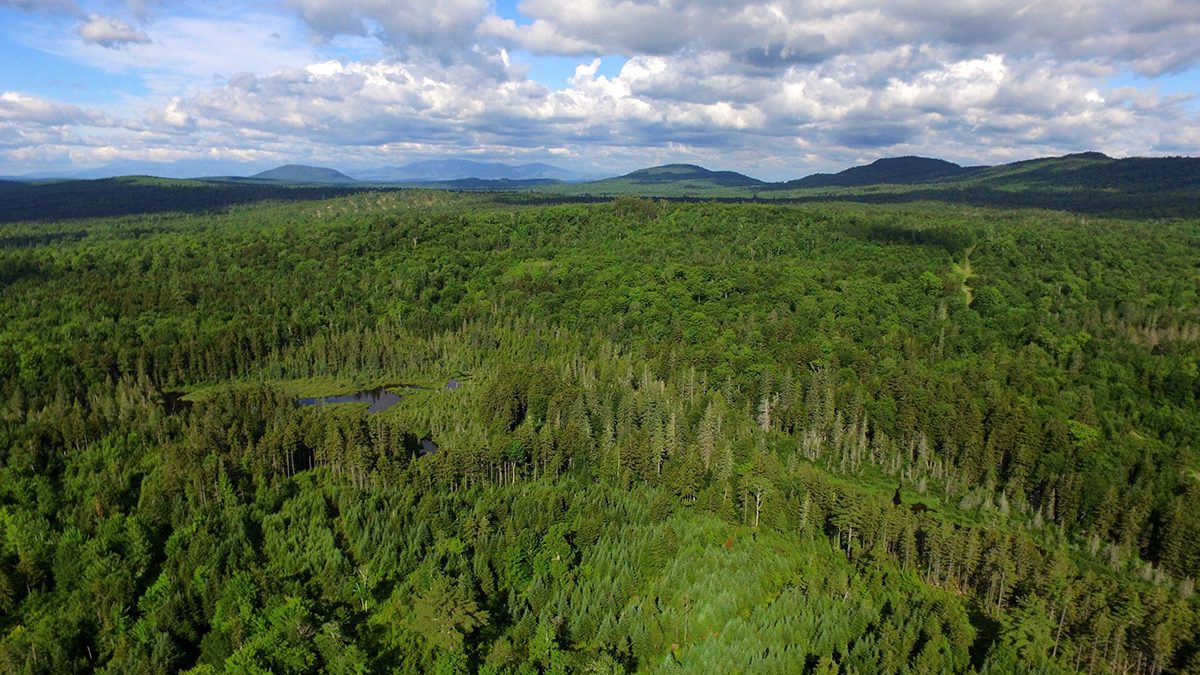After more than a decade of lobbying and negotiations at the federal level, December’s pandemic stimulus bill included a federal tax credit for the renewable wood heat industry.
The tax credit offers residential buyers 26 percent off new high-efficiency wood boilers but does not apply to commercial customers, reported David Thill of the Energy News Network. The credit will decrease to 22 percent in 2022 before expiring in 2024.
“The big impact of (the) tax credit is that we’re now on the same footing as other renewables,” said Les Otten, CEO at Maine Energy Systems — the largest producer of wood-pellet boilers in Maine. “That’s kind of a day to celebrate in Maine.”
The bill marks the first time the wood heat industry has been included in any renewable energy tax credits. Lobbyists and Maine senators Angus King (I) and Susan Collins (R) have supported the initiative since 2009.
“We’ve always gotten pushed aside for the flashy solar panels and windmills, and that seems to be where a lot of the federal money has gone for investment in infrastructure,” said Matt Bell, president and CEO at Northeast Pellets in Ashland. “It’s nice to see us get a little bit of share in that.”
The credit is expected to bring an economic boost to Maine. Bell and other wood heat proponents said the state’s potential in the forest products industry is huge; Maine is the most forested state in the country with nearly 90 percent forest cover, according to the United States Department of Agriculture.
“It’s a solid, Maine-based industry,” said Otten. “Almost every aspect of it is contained within the (borders) of the state of Maine.”
A 2017 Maine Forest Service report cited Maine’s wood heat industry as supporting hundreds of in-state jobs that generated almost $21 million in in-state economic benefits. It also saved community, commercial and educational buildings in Maine $5.5 million in annual heating costs.
Despite an excess of low-grade waste wood available in the state, Maine has the highest percentage of heating oil use in the country.
“Wood heat is just historically cheaper than oil, so it could be a double win for Maine homeowners,” said Eric Kingsley, vice president and partner at Innovative Natural Resource Solutions, a consulting firm that has lobbied for the tax credit over the last decade.
William Strauss, president of FutureMetrics, an international wood pellet consulting firm based in Bethel, agreed, adding that wood pellets also emit less carbon than heating oil.
“Some people are thinking about being green, and the carbon benefits … but most people are just looking for the lowest-cost way to heat their house,” said Strauss. “The tax credit is going to help make that buying decision a little easier.”
The federal credit comes on top of in-state support through Efficiency Maine’s wood and pellet heating incentives, and the inclusion of wood pellet boilers in state-level thermal renewable energy credits.
While the wood heat industry has gained recent recognition as a renewable resource on state and federal levels, over 500 scientific and economic experts issued a letter this week to world leaders calling for an end to subsidizing wood-burning technologies for energy.
Dr. Malcolm Hunter, a professor at the University of Maine, was among the scientists who wrote that releasing carbon by burning wood undermines the existing forest growth and carbon sequestration needed to slow the rate of global warming as quickly as possible.
Hunter said in an email that there are times when using waste wood for energy makes sense, but cutting forests primarily to generate wood energy products “ignores the fact that we need to protect current carbon reservoirs now to have any hope of better balancing our carbon budget in the coming decades.”
Wood heat proponents like Strauss of FutureMetrics noted that most wood pellets are made from forest byproducts and offer a sustainable solution to curbing our dependence on fossil fuels.
“As long as the growth rate of that forest as a whole is greater than or equal to the harvest rate, you’re not depleting anything. There’s no carbon debt,” said Strauss. “That sustainability criteria is the license for this industry to operate.”
While Strauss anticipates industry growth in the United States with the rollout of the Biden administration’s aggressive climate agenda, the letter issued to world leaders this week warns that harvesting trees and burning wood is not necessarily a carbon-neutral solution.
Dr. Ivan Fernandez studies how climate change affects forest ecosystems at the University of Maine and agrees with the stance academics took in the letter. Fernandez said expanding the wood burning industry makes it more difficult to reduce greenhouse gases in the near-term unless we significantly cut back on other carbon emission sources.
“Rapid expansion of burning wood as a fuel source is going to add to the problem because what the atmosphere sees is (carbon dioxide) from that combustion,” said Fernandez. “The problem that wood energy faces … is that if we burn the wood we add greenhouse gasses now during this critical window and we spend the rest of the century recapturing it.”
Both Strauss and Fernandez are concerned with meeting global climate goals by lowering global carbon emissions to lessen the effects of global warming. They just seek different means of achieving them.
Fernandez said finding the appropriate balance from an economic and ecological standpoint is key.
“We have to make a living off the resources that we have, so it’s totally appropriate to be asking the question about the utilization of wood for energy, but in the context of climate change — and that’s the reason why we’re not burning oil — we don’t want to swap one problem for another.”
Winter dredging activity
A proposed Coast Guard dredge in Jonesport received no public comments and is now undergoing federal and state permitting processes. The project will allow operators to dredge excess sediment and ensure Coast Guard vessels and other boats can move about the Jonesport harbor safely.
Once permits are approved from Maine’s Department of Environmental Protection and the U.S. Army Corps of Engineers, operators can begin dredging. The Maine Department of Marine Resources (MDMR) fields public comments before permits for federal or private dredge operations are issued each year.

The Jonesport dredge application is one of two submitted thus far in 2021, and there were 10 throughout 2020. On average, one to three Maine harbors get dredged every year between the winter dredge window of Nov. 8 and April 8.
“The time-of-year windows are put in place to minimize potential impacts to spawning and transiting fish, shellfish, nearby aquaculture leases and other vulnerable marine habitats,” said Denis-Marc Nault, supervisor at MDMR, by email.
Dredging also occurs in the winter to reduce the effects on commercial fishing operations — specifically lobstering and scalloping. The dredge haul route and disposal area are carefully chosen to avoid disrupting traps, entangling nets and disturbing important habitats.
The work is usually welcomed by commercial fishing communities Downeast because sediment buildup can prohibit smooth boating operations at low tide and cause boats to sit in mud.
“Most harbors in Maine have a relatively slow sediment deposition rate and it is generally 10 to 15 years or sometimes more between dredging,” wrote Nault. “However, some Southern Maine harbors need more frequent dredging.”
The Coast Guard hopes to complete the dredging in Jonesport by April, but state and federal permits can remain valid for up to 10 years.
Additional details requested from mining company
Two weeks ago Maine’s Land Use Planning Commission (LUPC) requested additional information from Wolfden Resources Corporation — a Canadian company looking to open two metal mines in rural parts of the state.

The 153-page document pulled together questions and concerns about the company’s plan from various sources, including the LUPC’s analysis, third-party contractors, government agencies and public comments.
The LUPC compiled the information request into 58 items spanning 15 categories, including:
- Project scope
- Soil suitability
- Financial practicability
- Reclamation and benefits
- Waste disposal
- Tailings management facility
- Best reasonably available site
- Surface water management
- Fish and wildlife
- Water supply
- Noise assessment
- Socioeconomic impact assessment
- Recreation
- Infrastructure
- Security
Most information requests came from project scope, waste disposal, tailings management facility and surface water management.
Wolfden must respond to the information requests by early April before a public hearing process begins. Public comments can still be submitted to the LUPC about Wolfden’s project; email vog.e1753906733niam@1753906733CPUL.1753906733gnino1753906733zerne1753906733dflow1753906733 to submit a comment.
Climate policy underscores national and local politics
Sen. Chloe Maxmin (D-Nobleboro) in 2018 became the youngest woman ever to serve in the Maine legislature at 26. Her progressive platform continues to make headlines following her move from the House of Representatives to the Senate this fall.

Wen Stephenson of The Nation interviewed Maxmin this week, citing her work introducing a “Green New Deal” bill for Maine, which foreshadowed the Mills administration’s statewide climate action plan.
“One of the big reasons I ran for office is that I’ve been so frustrated at the lack of decent climate policies, so when I was elected, I knew I wanted to do a climate bill,” Maxim told Stephenson.
Climate-conscious legislation on the federal level has been revitalized since President Biden and Vice President Harris took office in January.
Biden reversed environmental rollbacks put in place by the Trump administration on his first day in office, and signed over three dozen executive orders aimed at restoring environmental protection and addressing the coronavirus pandemic during his first week in the White House.
Biden re-enrolled the United States in the Paris Climate Accord, established a new role for John Kerry to serve as a climate czar on national security matters, and prioritized climate equity issues by creating environmental justice positions.








